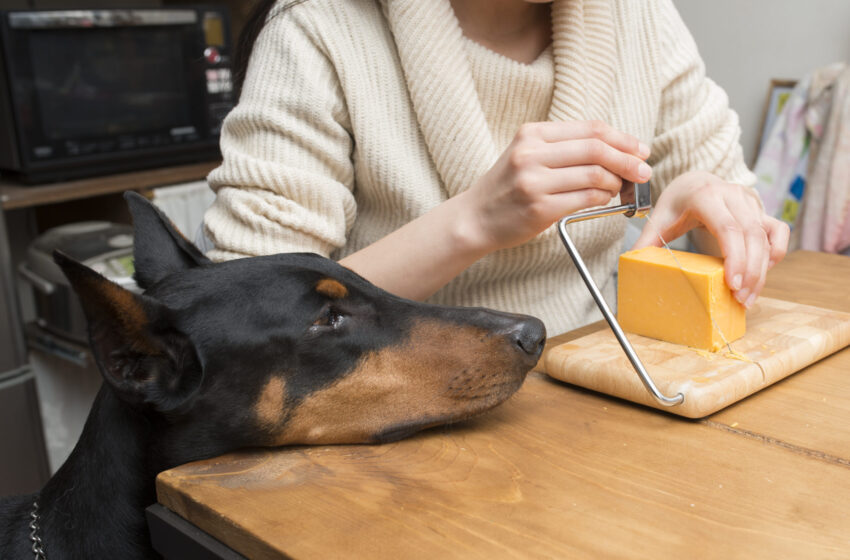Can Dogs Consume Dairy Products?

Doberman Pinscher resting its head on the kitchen table looking at cheese while a woman slices it.
Dogs can consume some dairy products, but it’s essential to be cautious as not all dogs tolerate lactose well. Lactose is the sugar found in milk that requires the enzyme lactase for digestion.
Many dogs, especially as adults, have reduced levels of lactase, making it challenging to digest lactose properly. As a result, feeding excessive amounts of dairy can lead to digestive issues such as diarrhoea, stomach upset, and gas.
Offer only limited amounts of dairy items, however, consider being equipped with dog insurance to manage any health upsets and emergencies. With cheap pet insurance, providing urgent vet care wouldn’t be as financially burdening during unforeseen health situations so contemplate purchasing a policy.
Read this article to learn about a few dairy items to feed your dog in limited portions.
Dairy products to feed your dog
Certain dairy products can be safe for dogs in moderation, as they offer nutritional benefits. Always introduce new foods gradually and monitor your dog for any adverse reactions. Low-lactose or lactose-free options are generally better tolerated by dogs.
1. Yoghurt
Plain, unsweetened yoghurt with live active cultures can be an excellent probiotic source, promoting gut health. It also contains calcium and protein. Start with small amounts and opt for yoghurt without added sugars.
2. Cheese
Many dogs can enjoy small amounts of cheese as a treat. Cheese is a good source of protein and calcium. Choose low-fat varieties and cut them into bite-sized pieces. Be mindful of high-fat content, as excessive fat can lead to pancreatitis.
3. Cottage cheese
This is another dairy option that is often well-tolerated by dogs. It is a good source of protein and calcium. Choose low-sodium and low-fat varieties.
4. Kefir
Kefir is a fermented milk drink that contains probiotics. It can be introduced in small amounts. Opt for plain, unsweetened kefir.
5. Frozen yoghurt treats
You can make homemade frozen yoghurt treats for your dog. Mix plain yoghurt with dog-safe fruits like blueberries or bananas and freeze the mixture in ice cube trays.
6. Milk replacements
There are lactose-free milk alternatives specifically designed for dogs, such as goat’s milk for dogs, which can be a suitable option.
Always check with your vet before introducing new foods into your dog’s diet, especially if they have pre-existing health conditions. Remember that moderation is vital, and not all dogs have the same tolerance for dairy, so it’s crucial to monitor your dog for any signs of digestive distress.
Instead of dairy products, you can even consider offering your dog alternative sources of nutrition. Opt for lean protein sources like cooked chicken or turkey, which provide essential amino acids.
For added vitamins and fibre, include carrots, cucumbers, sweet peas, and green beans. Explore grains like rice or quinoa for carbohydrates. Additionally, offer appropriate fruits like apples or blueberries as healthy treats.
Always ensure the food is dog-safe and free from seasonings, sweeteners, additives, or harmful ingredients. Consult your vet or a canine nutritionist for a diet tailored to your dog’s needs.
Simultaneously, consider being equipped with dog insurance because illnesses are often unpredictable and costly to treat. Contemplate getting cheap pet insurance at least so that unplanned vet costs wouldn’t be as difficult to cover.
